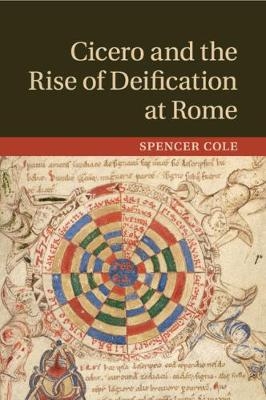
Cicero and the Rise of Deification at Rome
Seiten
2019
Cambridge University Press (Verlag)
978-1-108-73003-7 (ISBN)
Cambridge University Press (Verlag)
978-1-108-73003-7 (ISBN)
Building on fundamental re-evaluations of literature and religion in Rome in recent years, this study explores Cicero's innovative roles in debates about deification. By considering Cicero's works in their broader cultural contexts, it tracks changing concepts of death and the afterlife, and re-examines the backgrounds to ruler worship at Rome.
This book tells a part of the back-story to major religious transformations emerging from the tumult of the late Republic. It considers the dynamic interplay of Cicero's approximations of mortals and immortals with a range of artifacts and activities that were collectively closing the divide between humans and gods. A guiding principle is that a major cultural player like Cicero had a normative function in religious dialogues that could legitimize incipient ideas like deification. Applying contemporary metaphor theory, it analyzes the strategies and priorities configuring Cicero's divinizing encomia of Roman dynasts like Pompey, Caesar and Octavian. It also examines Cicero's explorations of apotheosis and immortality in the De re publica and Tusculan Disputations as well as his attempts to deify his daughter Tullia. In this book, Professor Cole transforms our understanding not only of the backgrounds to ruler worship but also of changing conceptions of death and the afterlife.
This book tells a part of the back-story to major religious transformations emerging from the tumult of the late Republic. It considers the dynamic interplay of Cicero's approximations of mortals and immortals with a range of artifacts and activities that were collectively closing the divide between humans and gods. A guiding principle is that a major cultural player like Cicero had a normative function in religious dialogues that could legitimize incipient ideas like deification. Applying contemporary metaphor theory, it analyzes the strategies and priorities configuring Cicero's divinizing encomia of Roman dynasts like Pompey, Caesar and Octavian. It also examines Cicero's explorations of apotheosis and immortality in the De re publica and Tusculan Disputations as well as his attempts to deify his daughter Tullia. In this book, Professor Cole transforms our understanding not only of the backgrounds to ruler worship but also of changing conceptions of death and the afterlife.
Spencer Cole is Assistant Professor in the Department of Classical and Near Eastern Studies at the University of Minnesota. His publications include articles on Roman religion in both the republican and imperial periods, Augustan poetry, and Greek drama. He is also a contributor to The Routledge Encyclopedia of Ancient Mediterranean Religions (2015).
Introduction; 1. The cultural work of metaphor; 2. Experiments and invented traditions; 3. Charting the posthumous path; 4. Revisions and Rome's new god; Conclusions.
| Erscheinungsdatum | 18.03.2020 |
|---|---|
| Zusatzinfo | Worked examples or Exercises |
| Verlagsort | Cambridge |
| Sprache | englisch |
| Maße | 150 x 230 mm |
| Gewicht | 300 g |
| Themenwelt | Geschichte ► Allgemeine Geschichte ► Vor- und Frühgeschichte |
| Geschichte ► Allgemeine Geschichte ► Altertum / Antike | |
| Geisteswissenschaften ► Geschichte ► Regional- / Ländergeschichte | |
| Geisteswissenschaften ► Religion / Theologie ► Weitere Religionen | |
| ISBN-10 | 1-108-73003-5 / 1108730035 |
| ISBN-13 | 978-1-108-73003-7 / 9781108730037 |
| Zustand | Neuware |
| Haben Sie eine Frage zum Produkt? |
Mehr entdecken
aus dem Bereich
aus dem Bereich
auf den Spuren der frühen Zivilisationen
Buch | Hardcover (2023)
C.H.Beck (Verlag)
20,00 €
Konzepte – Methoden – Theorien
Buch | Softcover (2024)
UTB (Verlag)
39,90 €
Was Pompeji über uns erzählt
Buch | Hardcover (2023)
Propyläen (Verlag)
32,00 €


